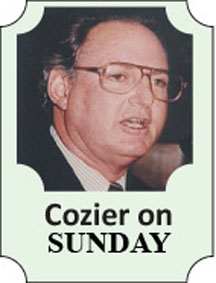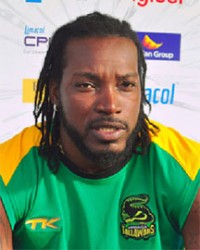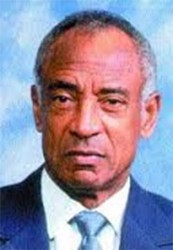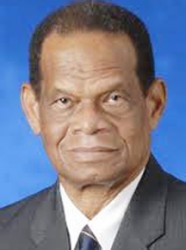CHRIS GAYLE’S open denunciation of the omission of Dwayne Bravo and Keiron Pollard from the World Cup squad last week was the latest in an extensive list of such forthright comments he has directed against the West Indies Cricket Board (WICB), its chief executive, its selectors and its head coach.
He saw the selection as “victimization”, a reference to Bravo’s role as captain and chief spokesman for the players on the abandoned tour of India in October and Pollard’s perceived connivance. He called the selection “ridiculous”, a word he used four times. Without the two, the team would not be at its strongest, he added.
Such opinions are widely held and expressed, by a prime minister and a cabinet minister of two separate Caricom states and, in print in this column among many others as well as on radio and television programmes by a media and a public just as disgruntled by the exclusion of the two.
The significant difference is that those who share them are, unlike Gayle, not members of a team that, whatever its deficiencies, faces a tough ride in the game’s most prestigious, globally followed tournament in Australia and New Zealand.
Sir Viv Richards has recognized the probable effect.
“It is plain to see from Chris Gayle’s reaction in South Africa that players are disgruntled and I am unsure how unified they are,” the celebrated icon of the glory years of West Indies cricket, wrote in his World Cup column on the ICC website last week. As a result, he was concerned that the dressing room “will not be a comfortable place to be in.”
 Gayle made his position unambiguously clear after his first serious run-in with the WICB two weeks after his first appointment as captain for the ODIs in England seven and a half years ago.
Gayle made his position unambiguously clear after his first serious run-in with the WICB two weeks after his first appointment as captain for the ODIs in England seven and a half years ago.
Once he had castigated the administration on his website for failing to get the ODI players in England in time for the warm-up matches, requiring the hurried call-up of stand-in West Indians from the leagues, WICB president Ken Gordon demanded an apology. Gayle refused, stating he had nothing to apologise for.
“I always stand up for what I believe in and when I’m wrong, I’m wrong and when I’m right, I’m right,” he told the media. “If there are any consequences you have to stand up and deal with it as a man. I’m always ready for anything.”
Just in case there was any lingering doubt over his relationships with the WICB, he added: “There is no love lost between myself and the board.”
Gordon was replaced as president by Julian Hunte shortly after Gayle’s rejection of the call for an apology and nothing more was heard of the matter.
There have been other contentious issues throughout Gayle’s career as the most consistently controversial and, at the same time, most universally popular of West Indies players. Given his present status as the most experienced and solitary star attraction in the team, he may recognise that consequences for him to stand up and deal with as a man are no longer likely.
During the 2008 home series against Australia, Gayle publicly complained that there were “a lot of things happening” with selection of the ODI team that he didn’t know about.
“The majority of the time we discuss about selection and sometimes I get something totally different,” he said at the time.
It led to him sending his letter of resignation as captain to the WICB; it was subsequently withdrawn after persuasion from Hunte. Gayle’s most intense clash with the WICB followed head coach Ottis Gibson’s comments on the senior players at the 2011 World Cup when they were knocked out at the quarter-final stage.



“When we left home we said our success would be built around our senior players performing and they haven’t,” Gibson charged. “This is not criticism, it is fact. The senior players have not performed. When the going got tough, we didn’t stand up to it.”
It didn’t need an understanding of semantics to know who Gibson was referring to. They were substantiated when Gayle, Ramnaresh Sarwan and Shivnarine Chanderpaul were dropped for the home ODIs against Pakistan a month later.
Gayle responded by labeling Gibson “a loser”, accusing him of undermining players’ confidence. The upshot was that the WICB told him he would have to retract such statements before he could be once more selected on the West Indies team. Predictably, Gayle stood his ground.
Ironically, Clive Lloyd, now the head of the selection panel that dropped Bravo and Pollard, was then a WICB director. In his judgment, it would have been “the intelligent thing to do” for Gayle to comply to get the issue resolved.
Lloyd added a sentence then that he could make now: “We need senior players to be in the set up to drive the progress forward and any team would love to entertain Gayle in their set up but under the right circumstances.”
It eventually took 18 months before Gayle was cleared for selection.
A joint statement announcing the settlement read: “Both sides admit that their respective shortcomings contributed to the debilitating impasse and its prolonged nature…(and) agree that there are lessons to be learnt from this episode by all concerned, which ought to redound to the benefit of West Indies cricket.” The latest conflict contradicts such intentions.
The examples of Richards and the current Twenty20 captain Darren Sammy are worth noting.
While Richards acknowledged that any limited-overs’ team would be “happy to have two players of the calibre of Bravo and Pollard”, he added that “at this stage, we also must respect the people who select the team and it is not for me to say whether this decision is right or wrong.”
After declining to be drawn into the debate “because that has never been me”, Sammy took a similar line.
“We would have liked to have a lot of players in our one day team but I am not in charge of who selects teams,” he said. “I know with all the controversy, guys will bounce back. That’s just cricket.”
What is just not cricket is for a senior member, however strong and justified his feelings, to openly and harshly criticize the selection of the team he represents.









